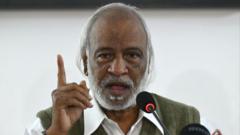A 22-member delegation comprising political leaders, civil society activists, academics, and journalists from Bangladesh has embarked on a significant 10-day visit to China. The delegation, led by Abdul Moyeen Khan, a senior official from the Bangladesh Nationalist Party (BNP), will engage in discussions with Chinese government officials as well as senior members of the ruling Communist Party. This initiative, which Khan describes as a "goodwill visit" organized by Beijing, seeks to establish stronger ties amid mounting diplomatic tensions between Bangladesh and India.
Analysts suggest that China's overtures come at a time when relations between Dhaka and New Delhi are strained over several critical issues, including the political exile of ousted leader Sheikh Hasina. Bangladesh has formally requested India's extradition of Hasina, who is facing numerous allegations, including crimes against humanity and money laundering, yet India has thus far declined to comply.
The delegation includes several representatives from the BNP and its affiliated groups, as well as leaders from the student movement that spearheaded protests against Hasina's leadership last year. Since Hasina's governance ended in August, the interim government led by Nobel laureate Muhammad Yunus has taken the reins and has actively pushed for India's cooperation in repatriating Hasina.
Historically, India and Bangladesh enjoyed close relations during Hasina's tenure, perceived by many as pro-India. However, following her removal, China has increased its engagement with various factions in Bangladesh, including Islamist parties. This visit to Beijing follows a January meeting between Bangladesh’s foreign policy advisor and Chinese Foreign Minister Wang Yi, marking the second BNP delegation visit to China in recent months.
In the absence of a strong Indian presence in Bangladesh’s political landscape, China is keen to enhance its influence in this South Asian nation of approximately 170 million people. Notably, China is Bangladesh's largest trading partner, with a bilateral trade volume of around $24 billion, predominantly in favor of Chinese exports. The Bangladeshi military also significantly relies on Chinese supplies, with over 70% of its military equipment coming from China.
While Beijing advances its diplomatic efforts, India's involvement with Bangladesh's interim government remains limited, leading to growing discontent among Bangladeshi officials, who have accused India of meddling in their internal affairs by supporting Hasina. Indian foreign minister Subrahmanyam Jaishankar recently expressed that the onus is on Bangladesh to determine its relationship with India, dismissing recent critiques as "absolutely ridiculous."
Such escalating friction between Dhaka and Delhi raises the possibility that Bangladesh may tilt more towards China. Observers note that this development places Bangladesh alongside Sri Lanka, the Maldives, and Nepal as nations caught in the geopolitical contest between China and India as both seek to extend their influence in the region. Analyst Zhou Bo from Tsinghua University cautions India to reconsider its view of South Asia as solely within its sphere of influence, suggesting that such an attitude may lead to greater challenges ahead.






















